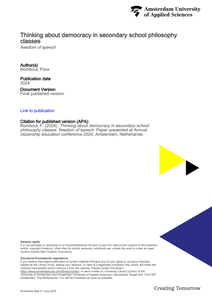Philosophy is an elective subject in secondary education in the Netherlands, which is not often studied in the context of citizenship education. This is probably because only a minority of students participate in philosophy classes in the upper grades of secondary education (approximately 2-5% of all students). However, especially in the years 2022-2025 philosophy is particularly interesting for those studying how citizenship education can be taught, because the higher general track students study a range of philosophical ideas about democracy for their final exams (Spoelstra et al., 2021).This paper presents a qualitative analysis of three philosophy classes about freedom of speech. The lesson transcripts, pre- and post-observation interviews with 3 teachers and 15 students (5 from each class) are coded thematically with a framework for four teacher responsibilities during philosophical discussion in moral education. These four responsibilities are: teachers have an organizational responsibility to facilitate lesson activities such as classroom dialogue to facilitate thinking about democracy, an epistemic responsibility to warrant valid reasoning and recognition of established facts during the lesson, a pedagogic responsibility to create a safe and open classroom climate and a moral responsibility to find the right balance between value communication and stimulation (Leenders & Veugelers, 2004; Rombout et al., 2022; Sprod, 2001). The main research question was: how do philosophy teachers realize these four responsibilities to facilitate their students’ thinking about democracy in a lesson about freedom of speech and how to teacher and students evaluate these responsibilities in this lesson?The findings contain rich descriptions of lesson activities such as considering borderline cases, facilitating teacher-led dialogue, organizing debate, and learning about philosophers’ arguments. These are supplemented with reflections of the participants on teacher neutrality and how open and safe the classroom climate was during these lessons.
DOCUMENT

Freedom of speech, plurality and self-regulation characterize the Dutch media system. With fading political parallelism, strong public service broadcasting and a fair level of professionalization the Dutch media system fits the model of Democratic Corporatist media system. Continuous debates on journalistic quality may result form freedom of speech as well as from a professional concern about media performance. The media context offers various professional accountability instruments like the press council and general codes of ethics, but some of them receive only moderate support. Moreover, there are great differences between news media with regard to their efforts at being transparent and accountable to the public. Some news media publish introspective articles by their ombudsman, readers' editor or editor-in-chief, publish their own codes, or experiment with innovative forms of accountability. This proactive openness is rather an exception than the rule and may well be a distinctive indicator for quality journalism.
DOCUMENT